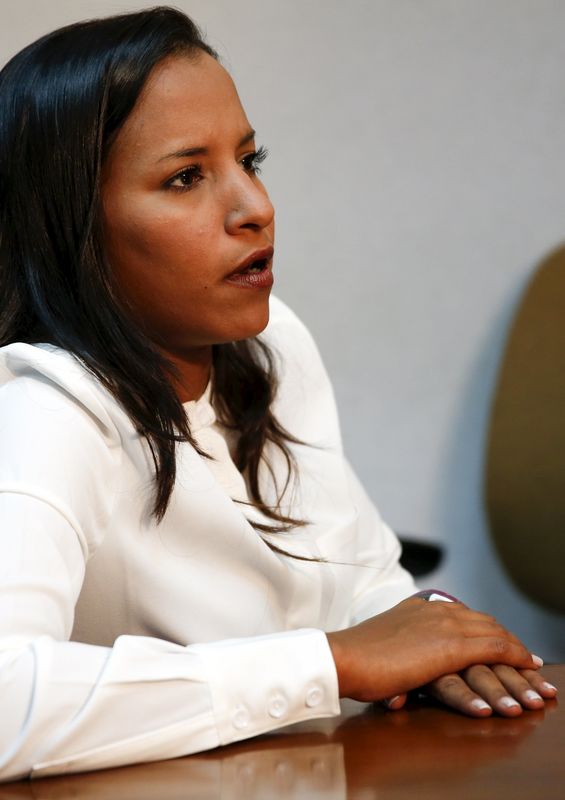By Alexandra Ulmer
CARACAS (Reuters) - She grew up in a poor and dangerous part of Caracas, was raised by a family fiercely loyal to late socialist leader Hugo Chavez and attended so many rallies that she can still sing along to tunes glorifying him.
Marialbert Barrios, 25, isn't your typical opposition politician.
Yet in this month's legislative elections, Barrios was one of 112 opposition lawmakers elected to Venezuela's National Assembly as voters punished the OPEC country's left-wing government for a gruelling economic crisis.
And she won in an area covering a cluster of Caracas' traditionally pro-Chavez slums, including the hillside stronghold of Catia, unexpectedly beating a top Socialist Party politician to become one of Venezuela's youngest lawmakers.
"There's a clamour for change. This is a broken, thieving government," said Barrios, a member of the Justice First opposition party who first entered anti-government politics when she was a student at a state-run university.
Victories like hers have helped shake up the image of the opposition, which struggled throughout Chavez's 1999-2013 rule to appeal to the poor and tap leaders from poorer families.
The main opposition coalition has worked to change that in recent years and has slowly been reaping electoral rewards.
"People need lawmakers who understand, know, and live their same problems," Barrios said in an interview in Caracas.
Inspired by two-time presidential candidate Henrique Capriles' grassroots outreach strategy, Barrios campaigned in the subway, markets, and even while queuing up for goods at poorly-stocked stores.
Other opposition politicians made inroads in poor areas that have suffered the brunt of the recession, helping the opposition win a two-thirds legislative majority.
Nearby, in the 23 of January slum home to Chavez's mausoleum and dotted with murals of leftist icons including Argentine revolutionary Ernesto "Che" Guevara, the opposition also staged an upset win.
And in another symbolic shift, Chavez's home state of Barinas in Venezuela's sweltering central plains flipped allegiances with even the late leader's brother losing to the opposition.
SOCIAL WELFARE
Many Venezuelans voted against the government rather than for the opposition, driven by anger over shortages of food and medicine, prohibitive inflation, and violent crime.
President Nicolas Maduro, who won power after Chavez's death in 2013, lacks his mentor's legendary charisma and political skills and has seen his approval ratings plummet.
Still, the opposition remains fragmented and led by scions of wealthy families, and has an upward battle to convince wary Venezuelans it deserves their trust.
"Catia has always been forgotten but we hope it will be different this time," said Yeni Santana, a manicurist and former Chavez supporter who voted for Barrios.
From the National Assembly, Barrios aims to tackle the economic turmoil that has made life in Venezuela increasingly unlivable. Of her class of 30 in university, for instance, she says around 27 have left the country.
While the opposition-led Congress cannot address the roots of the crisis, namely distorted currency and price controls, it hopes to heighten pressure on the government to publish hidden economic data and investigate corruption.
Maduro claims the opposition is in fact plotting to axe social projects like the "Great Venezuelan Housing Mission," in which authorities build or refurbish homes for low-income families.
But leaders like Barrios say such projects should instead be improved, pointing to the fact residents do not have property titles, which she says allows them to be pressured into voting for "Chavismo."
"We're going to strengthen the 'Missions,'" she said. "Why don't they give them property rights? How can they give you a house and then take it away depending on whether you vote or not?"
While acknowledging that legislating amid a crisis and polarized politics will be trying, Barrios stressed the opposition's long-awaited opportunity to push for change had finally arrived as the poor sour on Maduro.
"The project in which my parents believed has died," Barrios said, adding that they also started to turn against the government when they saw her protesting at university and have fully rejected "Chavismo" since the economy went downhill.

She says they too are delighted with her election victory.